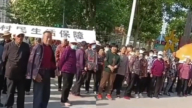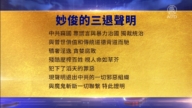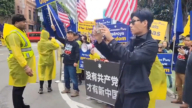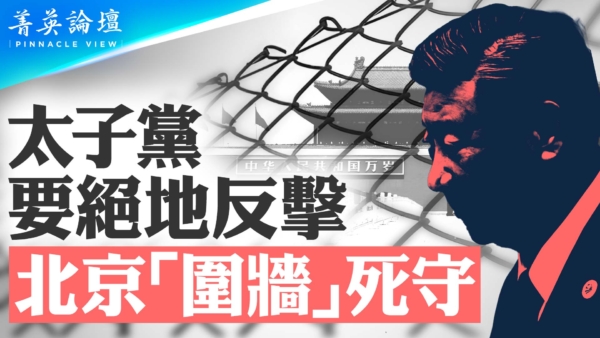【新唐人2013年11月15日讯】中共十八届三中全会闭幕后,上海和深圳股市双双下跌约2%,并没有上演所谓的“庆祝行情”,反而出现七个星期以来的最大跌幅,显示中国政治、经济局势动荡,让投资者不看好。虽然中国股市在14号弱势反弹,沪深股指涨幅不大,成交量也没有放大,市场整体情绪看来是相当谨慎。
中共结束了为期四天的十八届三中全会闭门会议,这是习、李上台后第一次最高权力部门的政策宣示。
会议宣布设置由习近平、李克强控制的“国家安全委员会”和“深化改革领导小组”, 强调“完善国家安全体制和国家安全战略”。
虽然中共媒体在这之前,曾高调炒作涉及司法、国企和土地等敏感议题,但总体改革力度低于预期。三中全会会后的公报也没有展示改革金融领域和国营企业的决心,没有实质的政策出台,在市场欠缺炒作借口之下,投资者纷纷抛售手中的股票。
美国《华尔街日报》指出,三中全会的改革方案措辞含糊,对改革问题都是点到为止,未达到投资者预期。使得上证综指13号开低走低,重挫1.83%,失守2,100点关卡,以2,087.94点近全日最低点收盘,也创下近3个月的新低﹔深圳成指与香港恒生指数也分别下滑2.03%与1.91%。
报导引述中国银盛财富管理首席策略师郭家耀的看法,认为,三中全会没有为市场带来好消息,而近期有大批恒指牛证收回区,集结在22400-22600点,进一步加大市场压力。
《新唐人》特约经济评论专家马杰森:“中国的经济如果不解决现在面临的问题,是没有前途的。某一个层面来讲,三中全会的不作为就是展现中国未来经济的不作为,或者是延续老路。所有这些事情,全球看到了,看到了以后,就以一种股票下跌来展现他们对未来的中国经济没有信心。”
虽然中国股市在14号稍微的弱势反弹,但沪深股指涨幅不大。其中比较活跃的股类是安防、军工和信息安全等,国企改革方面仍然是令人失望的局面,油气、金融和电力等权重股表现不佳。
根据三中全会的公报,公有制为中国的经济主体,必须毫不动摇巩固和发展公有制经济,坚持公有制主体地位。
大陆经济学者杨斌:“这些都是套话,这些都是以前的,对吧,但他里面强调一个国营企业,这个主导地位,控制力和影响力。因为国有企业的效率大家都知道,而且是少数人,国有企业的就业率是非常低的,进去大家都待那么久,而且都是什么人?他要增加国企的活力,本来经济就已经搞的掉地了,非常让大家失望。”
英国《路透社》报导说,虽然三中全会政策细节将陆续公布,但全会公报内容模糊,表明中共没有计划要大幅减少国家在经济中的角色。据了解,中共推动改革涉及很多人的既得利益,三中全会上出现激烈的争吵。
采访/陈汉 编辑/黄亿美 后制/钟元
Chinese Stocks Stumble on The Closing of The Third Plenum
Following the end of the Third Plenary Session of the Chinese
Communist Party, Shanghai and Shenzhen stock markets
both fell by about 2%, the lowest in the past 7 weeks.
This seems to signal that investors are discouraged by the
politics and economy in China.
On the 14th, the weak rebound and the slow rising of the
Shanghai and Shenzhen stock index indicated
the overall cautious market.
Following the four-day closed-door meeting of the third plenum,
CCP leaders Xi Jinping and Li Keqiang gave their first
statement from the highest power organ.
The communiqué of the Third Plenum declares that the CCP
will set up a central leading team for “comprehensively
deepening reform".
The country will establish a state security committee,
improving systems and strategies to ensure national security.
The previous high-profile hype on the state media regarding
sensitive issues of justice, state-owned enterprises and land
did not make a ripple in the meeting.
The announcement’s lack of determined and substantive
talk on reform in the financial sectors and state-owned
enterprises led the market to stumble from lack of confidence.
Wall Street Journal reported that China shares ended lower
on the 13th after the Third Plenum “offered investors
vaguely worded plans only,
and CCP leaders have failed to address issues
that investors expected to be addressed.
The Shanghai Composite Index dropped 1.83% to 2,087.94
at the close, the lowest in the past 3 months.
The Shenzhen Component Index on the Shenzhen Stock
Exchange fell 2.03%, and Hong Kong’s Hang Seng Index
fell 1.9%.
The WSJ Chinese report quoted China Yinsheng Wealth
Management chief strategist Matthew Kwok who says
he thinks that the Third Plenum has disappointed the market.
A large number of HKex Bull Contracts have been sold at the
strike price of 22,400 to 22,600,
which has further increased the market pressure.
Ma Jiesen, NTD’s economy specialist: “China’s economy
has no hope for its future if it’s problems are not resolved.
To certain extent, the disappointing Third Plenary Session
shows China’s disappointing economic future.
The falling market just represents how the world is showing
their lack of the confidence in the future (of China)."
There was slight rebound on the 14th,
and the Shanghai and Shenzhen stock index rose slightly.
Security, defense, and information stocks were active,
while oil and gas, finance and electricity were poor performers.
The Third Plenum communiqué informs that China will stick
to the dominant role of public ownership, playing the leading
role of the state-owned economy.
Yang Bin, economist: “These are clichés.
But they also emphasize that state-owned enterprises will take
the leading role to control and determine the economy.
We’re all aware of the efficiency of the state-owned enterprises.
The employment rate of state-owned enterprises is very low.
Everyone stays there once they get in, and we know who gets in.
He (Xi Jinping) wants to increase the vitality of state-owned
enterprises.
All of the state-owned enterprises have occupied large assets
in locals. People are surely disappointed."
Reuters reported that while the CCP had issued more details
with the end of the Third Plenum, the report’s lack of detail
“also made clear that it had no plans to radically
reduce the role of the state in the economy."
It is said that “some reforms still face stiff resistance from
powerful interest groups" and “heated debates"
during the closed-door meeting.
Interview/ChanHan Edit/HuangYimei Post-production/ZhongYuan






























